For our Earth Day Writing Competition, we enlisted the guidance of the Earth Day Network, Bow Seat Ocean Awareness Programs, Children’s Environmental Literacy Foundation (CELF), Grand Canyon National Park and Save Elephant Foundation to help us think critically about the impact we humans have had on planet Earth. Today, we share Earth Day Network Education Director Dr. Tracey Ritchie’s tips for using writing as a catalyst for environmental change.

What are you looking for in a winning entry?
In a winning entry, I am looking for a clear message, strong conviction, innovative ideas, and passion. I am not looking to be overwhelmed by an expansive vocabulary, or technical jargon. I want to see that you care, have hope, and are committed to the topic. While I do want you to write from the heart, I also want to see that you’ve done your research and have an informed and accurate understanding of the issues you describe or address.
What are some steps our young writers can take to protect our environment throughout the year?
As the saying goes, Earth Day is Everyday! Earth Day Network also says, it is not a day, it is a movement. There are so many “green” actions we can take in our everyday lives to be better stewards of this planet. This generation has been taught conservation and recycling since they were born. But now, we need to do much more than turning off the faucet when we brush our teeth or recycle a water bottle. We need to think about all aspects of our actions and decisions and the long term consequences of some of our choices. We need to question the habits and patterns we were raised with and make better decisions with what we buy, what we wear, the food we eat, how we dispose of our waste, and how we use any natural resource.

Can you tell us a bit about the Earth Day Network and how our young writers can get involved in the work you’re doing?
Earth Day Network is the global coordinator of Earth Day. We work with partners all across the world to not only establish the yearly theme for Earth Day, and coordinate large-scale events, but also work year round to build environmental literacy in individuals, students, families, elected officials, faith leaders, and community leaders. There are so many ways students can get involved with Earth Day Network, especially as we prepare for Earth Day 2020, the 50th anniversary! We have toolkits and resources available on our website—www.earthday.org. We offer ideas for actions, talking points, sample petitions, and ways to practice civic engagement. For young writers, we have many opportunities to author guest blogs and create work that we can feature on our website and social media. We want to provide students all the tools and resources they need to help make a difference for our planet!
About Dr. Tracey Ritchie
Tracey joined the Earth Day Network as the Director of Education in January 2018. Most recently she was adjunct faculty at the University of Florida and has held positions from Florida to North Carolina managing and facilitating Environmental Education programs.
Tracey completed her PhD at the University of Florida in 2017. Her research focused on developing systems thinking skills in students and teachers to more effectively communicate about complex environmental issues such as climate change. She also holds a Master’s degree in Environmental Education from Florida Atlantic University and a Bachelor’s degree from UF in Wildlife Ecology and Conservation. Tracey has been active in the field of Environmental Education for over 12 years.





